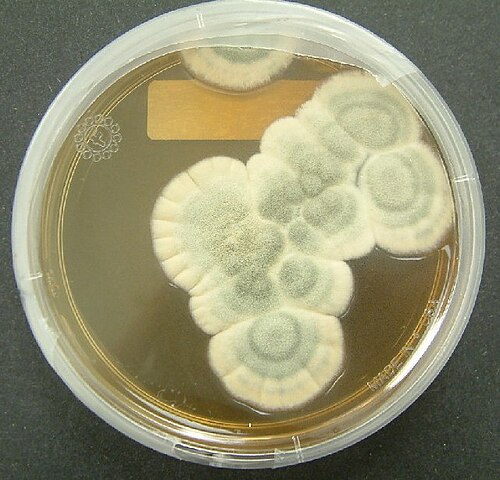Funginoun
plural of fungus
Funginoun
(pathology) Spongy, abnormal growth, as granulation tissue formed in a wound
Fungi
A group of thallophytic plant-like organisms of low organization, destitute of chlorophyll, in which reproduction is mainly accomplished by means of asexual spores, which are produced in a great variety of ways, though sexual reproduction is known to occur in certain Phycomycetes, or so-called algal fungi. They include the molds, mildews, rusts, smuts, mushrooms, toadstools, puff balls, and the allies of each. In the two-kingdom classification system they were classed with the plants, but in the modern five-kingdom classification, they are not classed as plants, but are classed in their own separate kingdom fungi, which includes the phyla Zygomycota (including simple fungi such as bread molds), Ascomycota (including the yeasts), Basidiomycota (including the mushrooms, smuts, and rusts), and Deuteromycota (the fungi imperfecti). Some of the forms, such as the yeasts, appear as single-celled microorganisms, but all of the fungi are are eukaryotic, thus distinguishing them from the prokaryotic microorganisms of the kingdon Monera.
Funginoun
the taxonomic kingdom of lower plants
Funginoun
(pun) the one who buys the drinks
Fungusnoun
(mycology) Any member of the kingdom Fungi; a eukaryotic organism typically having chitin cell walls but no chlorophyll or plastids. Fungi may be unicellular or multicellular.
Fungusnoun
Any one of the Fungi, a large and very complex group of thallophytes of low organization, - the molds, mildews, rusts, smuts, mushrooms, toadstools, puff balls, and the allies of each. See fungi.
Fungusnoun
A spongy, morbid growth or granulation in animal bodies, as the proud flesh of wounds.
Fungusnoun
a parasitic plant lacking chlorophyll and leaves and true stems and roots and reproducing by spores
Fungus
A fungus (plural: fungi or funguses) is any member of the group of eukaryotic organisms that includes microorganisms such as yeasts and molds, as well as the more familiar mushrooms. These organisms are classified as a kingdom, separately from the other eukaryotic kingdoms, those being Plantae, Animalia, Protozoa, and Chromista.



























